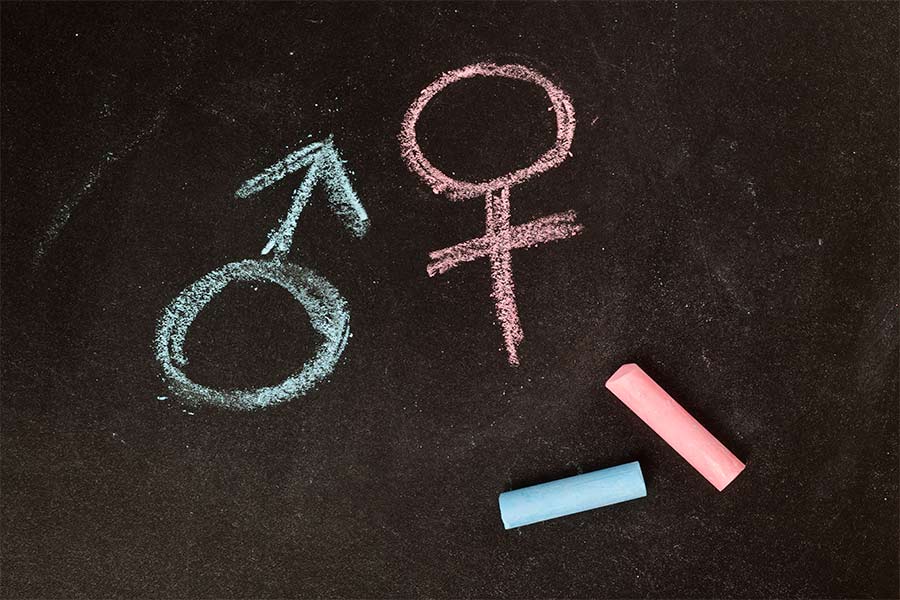
Words matter. Definitions matter.
People understand that without a common language and vocabulary that everyone can agree on, communication breaks down.
Most words retain a similar definition over time. Sometimes, though, words can take on new or additional meanings.
Today, words connected to human sexuality have seen some of the greatest fluctuations, and dictionaries are struggling to keep up. In just the last 10-15 years, dictionaries have changed the definitions of words with established meanings like marriage, man and woman, and male and female, and are adding new words like genderqueer, nonbinary, and a myriad of others.
In the midst of this flux, “sex” is another such word that activists are seeking to redefine.
The redefinition of ‘sex’
For hundreds of years, sex has referred to “either of the two major forms of individuals that occur in many species and that are distinguished respectively as female or male especially on the basis of their reproductive organs and structures.” Or, as Webster defined it in the 1828 edition, “The distinction between male and female.” Toward the beginning of the 20th century, the word “sex” also came to include the act of sexual intercourse.
Today, however, activists are trying to continue expanding the definition of sex to also include “sexual orientation” and “gender identity” (SOGI), arguing that laws like Title IX (passed in 1972 to combat sex discrimination in education) should also include SOGI, even though sex had no such meaning in 1972.
In response, many states are passing laws reaffirming that the word “sex” means what it has meant for hundreds of years, referring to the male and female biological binary—men and women.
ACLU redefines ‘re-definition’
The American Civil Liberties Union (ACLU) is labeling such bills “Re-Definition of Sex” bills. The ACLU argues that such laws “attempt to exclude trans and nonbinary people from protection under the law by embracing definitions of ‘woman’ and ‘man’ that are solely about reproductive capacity.”
The irony of such a statement seems to be lost on the ACLU.
These bills could hardly be called “Re-Definition of Sex” bills when they merely seek to reiterate how the term “sex” has been understood for centuries.
One such bill the ACLU labels a “Re-Definition of Sex” bill was passed in Idaho in 2024, House Bill 421. HB 421 clarifies what certain words mean in Idaho law: for example, the word “boy” means “a minor human male,” “father” means “a male parent,” and “female” means “an individual who has, had, will have, or, but for a developmental or genetic anomaly or historical accident, would have the reproductive system that at some point produces, transports, and utilizes eggs for fertilization.”
Again, these definitions aren’t new and have been widely understood and accepted for hundreds of years. And it is what the legislators originally intended it to mean when they first used the term in state law.
The ACLU may not like what these so-called “Re-Definition of Sex” bills are trying to do, but it is the activist organization that is trying to redefine sex, not these states.
ACLU won’t define ‘sex’ at Supreme Court
In January 2026, the Supreme Court heard oral arguments for two cases, Little v. Hecox and State of West Virginia v. B.P.J., in which the states of Idaho and West Virginia defended their laws safeguarding women’s fairness and safety in athletics.
During the arguments, both attorneys representing the challengers to the state laws were asked to give a definition of sex. Their responses were telling.
Kathleen Hartnett of Cooley LLP, representing the challenger in the Idaho case, said, “We do not have a definition [of sex] for the Court.”
In the West Virginia case, Joshua Block, an attorney from the ACLU, did not provide any clarity. Rather, he said, “I think there are a whole range of sex-based characteristics that can give rise to discrimination.” In his argument, he also stated about Title IX (the law which prohibits “sex discrimination”), “… I don’t think the purpose of Title IX is to have an accurate definition of sex. I think the purpose is to make sure that sex isn’t being used to discriminate…”
Confused? You should be.
By sleight of hand, the ACLU is trying to define “sex” while using terms like “sex-based characteristics.” This is circular reasoning, plain and simple. When trying to define “sex,” you can’t use sex in the definition. Similarly, the ACLU is trying to allege “sex discrimination,” without defining “sex.” You cannot allege discrimination because of sex while declining to say what sex is.
In light of that, another tactic the ACLU employed was to accept any definition of “sex,” even accepting the state’s definition of sex to mean biological sex, while maintaining that their client had been discriminated on the basis of sex. Such a ploy reveals their hand. If discrimination exists no matter how “sex” is defined, then sex isn’t really the issue at all because the conclusion is already decided (i.e., they are begging the question). By refusing to say what sex means while claiming discrimination under every possible meaning of sex, the ACLU drains the word of meaning and asks the Court to enforce a rule without boundaries.
The ACLU used to know what ‘sex’ meant
A further point of irony in this discussion is that the ACLU is contradicting its past usage of “sex.” In 1970, the ACLU filed a brief alongside future Supreme Court Justice Ruth Bader Ginsburg in a case called Reed v. Reed, one of its first women’s rights cases.
In the brief, the ACLU used language like “both sexes” and “the female sex” to combat “sex discrimination,” at one point remarking, “When biological differences are not related to the activity in question, sex-based discrimination clashes with contemporary notions of fair and equal treatment.”
In addition to the organization’s own arguments, the brief included citations from experts and court decisions that tied sex to biology.
- “[S]ex … [is] defined by physiological characteristics, through which status is fixed from birth.”
- “Sex … is an immutable trait, a status into which the class members are locked by the accident of birth.”
The ACLU of 1970 seemed to understand that there are two sexes and that “sex” is tied to biology. That’s clearly not the case with the ACLU of today.
Playing word games
Labeling bills that affirm the traditional definition of “sex” as “Re-Definition of Sex” bills isn’t accidental. It’s a deliberate attempt to normalize recent radical changes in the culture around gender and sexuality while trying to make historically rooted, biologically based definitions of “sex” seem novel and extreme. Meanwhile, when the ACLU attempts to challenge the meaning of “sex” in Title IX, they have no definition of their own to offer but still allege “sex discrimination.”
The ACLU shouldn’t be playing such word games. If the ACLU intends to make legitimate arguments, it shouldn’t need to twist words like “sex” to do so.

-150x150.jpg)
-1024x1024.jpg)



